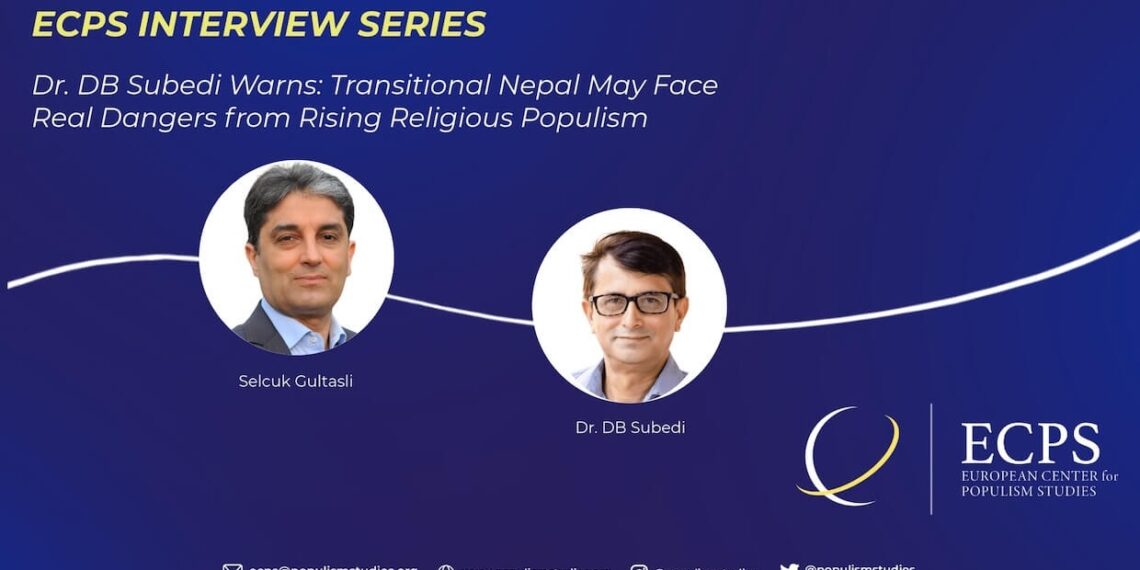“Transitional Nepal may face real dangers from rising religious populism,” cautions Dr. DB Subedi, lecturer in Peace and Conflict Studies at the University of Queensland, in an interview with the ECPS. While the September 2025 youth-led uprising signaled a break with entrenched corruption, nepotism, and elite capture, Dr. Subedi warns that Nepal’s weak secularism leaves space for actors seeking to reinstate Hindu statehood. Such a trajectory, he argues, risks fusing populist nationalism with sectarian identity—posing a greater threat than conventional elite dominance. Yet he also sees in Gen Z’s unprecedented mobilization the embryonic signs of a participatory, post-elitist democracy. Much depends, he stresses, on whether Nepal’s interim government can ensure a smooth, accountable transition to elections.
Interview by Selcuk Gultasli
“Transitional Nepal may face real dangers from rising religious populism,” warns Dr. DB Subedi, a leading scholar of peace and conflict studies at the University of Queensland, Australia. In an exclusive interview with the European Center for Populism Studies (ECPS), Dr. Subedi argues that while Nepal’s September 2025 uprising carries the seeds of a more participatory, post-elitist democracy, the country also risks sliding into a form of exclusionary right-wing politics. Having been the world’s only Hindu state until 2015, Nepal is now formally secular but only weakly so in practice. Everyday political life continues to be saturated with religion, leaving space for political actors and interest groups who seek to reinstate Hindu statehood. In Dr. Subedi’s assessment, this trajectory could open the door to religious populism—an outcome more dangerous than other forms of elite capture because it fuses populist nationalism with sectarian identity.
Yet, Dr. Subedi stresses, the September uprising cannot be reduced to a story of risks alone. It is also a product of deep structural inequalities, socioeconomic stagnation, and the frustrations of a digitally native generation. What began as a protest against the Oli government’s ban on 26 social media platforms quickly crystallized into a mass youth-led revolt against corruption, nepotism, and elite reproduction. The protests were unprecedented in scale, non-hierarchical in organization, and notable for their broad public legitimacy. Dr. Subedi sees in this horizontal mobilization the embryonic forms of a post-elitist democracy, rooted less in patronage or coercion and more in inclusive participation.
Placing Nepal within a wider regional frame, Dr. Subedi draws parallels with Sri Lanka’s Aragalaya (2022) and Bangladesh’s anti-quota protests (2024). Across these South Asian contexts, the drivers are strikingly similar: generational exclusion from politics, widening socioeconomic inequality, and a pervasive sense of injustice. In each case, social media functioned both as a catalyst and as connective tissue, transforming diffuse frustrations into coordinated movements. Yet Nepal’s fragile secularism makes it particularly vulnerable to the instrumentalization of religion by authoritarian populists, as has been evident in Bangladesh.
For Dr. Subedi, the stakes of the coming months are therefore clear. Much depends on whether the interim civilian government—tasked with organizing elections within six months under the leadership of former Chief Justice Sushila Karki—can ensure a smooth, legitimate transfer of power. The challenge lies not only in delivering credible elections but also in holding past regimes accountable for corruption and abuses of power, while simultaneously preventing a populist-nationalist hijack of the transitional moment.
In the conversation that follows, Dr. Subedi provides a detailed analysis of Nepal’s September uprising, reflecting on its social, economic, and political roots, situating it in the broader South Asian context, and sounding a critical warning about the dangers of religious populism in Nepal’s fragile democracy.


